Two Key Thoughts on Mass Shootings
Part 1

There have been three high profile mass shootings in the United States is less than a week. In Gilroy, CA three were killed and twelve injured on July 28th; yesterday in El Paso, TX at least 20 were killed and another 26 injured; and, early this morning in Dayton, OH, at least nine have been killed and another 26 injured.
The NYT further informs me of 29 other mass shootings just this year (and it is only early August):
The bloodshed in Ohio on Sunday was the 32nd mass killing by firearms in the United States this year. A mass killing is defined by the Justice Department as three or more killings in a single episode. There is no legal definition for the term “mass shooting,” despite its frequent use by gun control groups and the news media.
Source: A Week of Bloodshed Underscores a Spate of Mass Shootings
The piece goes on to list a number of multiple-victim homicides committed with firearms in 2019.
I am struck this morning how Gilroy already seems like a distant event.
At any rate, two thoughts come to mind. Neither are especially original, but they nonetheless are worth repeating and discussing.
The Key Variable: Gun Availability
There is a lot of talk today (as there is every time we have one of these events) about mental health and video games (notably by Texas Lt. Governor Dan Patrick and House Minority Leader Kevin McCarthy). Yes, we need more resources into mental health care (although I do not think the party of the gentlemen in question cares to fund such) and no, video games are not the problem.
I fully understand the constitutional, legal, cultural, and logistical problems associated with gun control, but the bottom line is clear: other advanced industrial countries have citizens who play video games and who have mental health issues. What they do not have are frequent (or, in many cases, any) mass shootings.
From a NYT piece a few years ago (What Explains U.S. Mass Shootings? International Comparisons Suggest an Answer):
Americans make up about 4.4 percent of the global population but own 42 percent of the world’s guns. From 1966 to 2012, 31 percent of the gunmen in mass shootings worldwide were American, according to a 2015 study by Adam Lankford, a professor at the University of Alabama.
Adjusted for population, only Yemen has a higher rate of mass shootings among countries with more than 10 million people
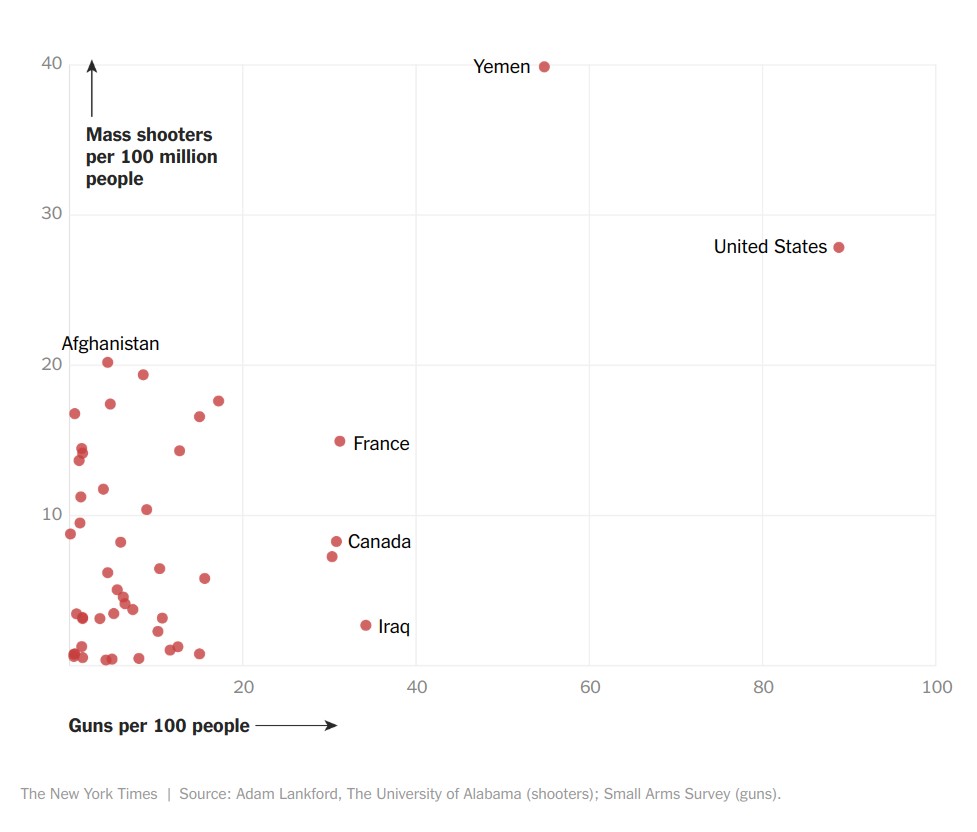
Here is a listing of gun ownership (using the same data as used in the graph above) for democracies:
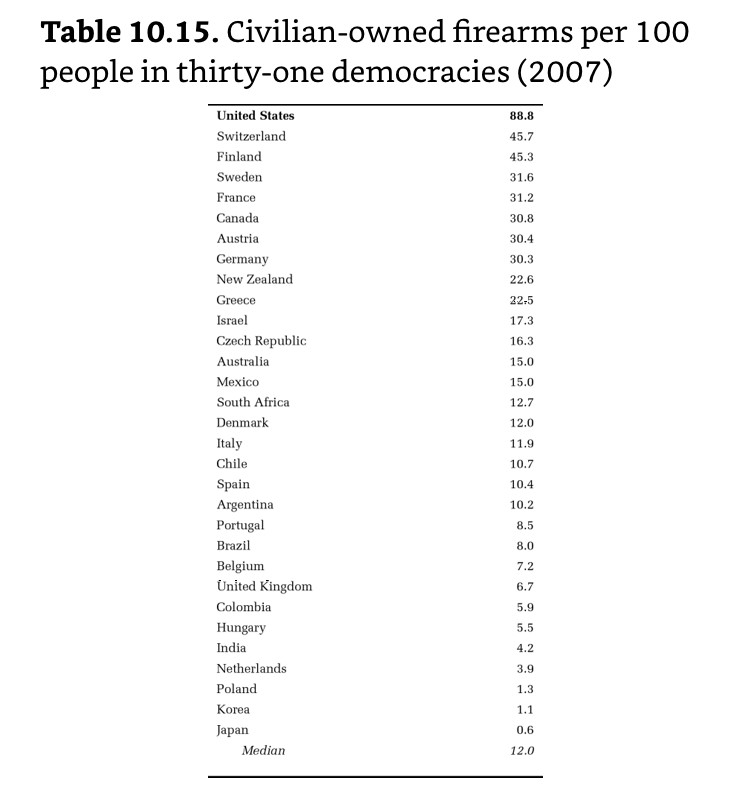
The correlations are clear (and yes, I understand that correlation is not causation). But to repeat: other countries have mental illness. Other countries have violent video games. Other countries have violent movies. Only the US has the mass shooting problems that we have, and guns are remarkably easy to get in the United States.
Indeed:
If mental health made the difference, then data would show that Americans have more mental health problems than do people in other countries with fewer mass shootings. But the mental health care spending rate in the United States, the number of mental health professionals per capita and the rate of severe mental disorders are all in line with those of other wealthy countries.
A 2015 study estimated that only 4 percent of American gun deaths could be attributed to mental health issues.
Whether a population plays more or fewer video games also appears to have no impact. Americans are no more likely to play video games than people in any other developed country.
Racial diversity or other factors associated with social cohesion also show little correlation with gun deaths. Among European countries, there is little association between immigration or other diversity metrics and the rates of gun murders or mass shootings.
Further,
Americans sometimes see this as an expression of deeper problems with crime, a notion ingrained, in part, by a series of films portraying urban gang violence in the early 1990s. But the United States is not actually more prone to crime than other developed countries, according to a landmark 1999 study by Franklin E. Zimring and Gordon Hawkins of the University of California, Berkeley
And, in fact,
More gun ownership corresponds with more gun murders across virtually every axis: among developed countries, among American states, among American towns and cities and when controlling for crime rates. And gun control legislation tends to reduce gun murders, according to a recent analysis of 130 studies from 10 countries.
To broaden the point beyond even murders or mass shootings, gun laws matter. To wit (from a recent USAT piece):
Children living in states with more restrictions on firearms are less likely to die from them, a new study says.
States with the strictest gun laws had about 40% fewer firearm-related deaths among children compared with states with the most lax laws, according to the study, published Monday in journal Pediatrics.
[…]
Her team also found that states mandating universal background checks prior to gun purchases had 35% lower gun-related mortality rates in children.
Source: Fewer kids die from guns in states with stricter laws, study says
At a minimum, I would appreciate it if people like Patrick and McCarthy would just be honest and state that mass shootings are the price we pay for our open and easy access to firearms, rather than pretending like Fortnite of Call of Duty is to blame.
Such a position would at least be honest.
Part 2 can be found here.

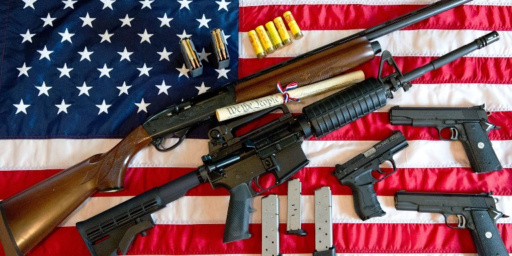
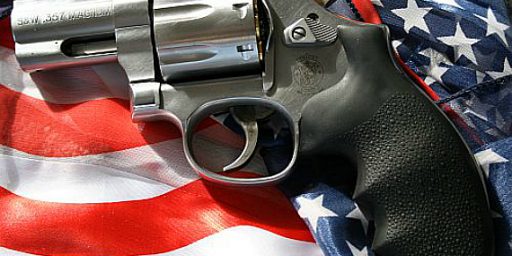


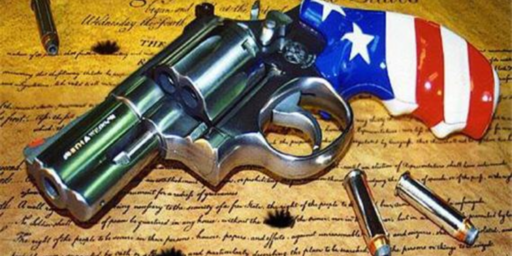
Of course. Obviously. Well, obvious to any rational, disinterested observer.
The NRA and the GOP (with a sprinkling of Dems) are arms suppliers to terrorists. They work diligently to ensure that white supremacist terrorists are well-armed. Is that their professed motive? No. Is it the effect they have? Yes.
What we also have here is 8chan and reddit, discussion here at NMMNB:
https://nomoremister.blogspot.com/2019/08/were-trying-to-avoid-making-mass.html
If we want something done, we’ll change the Senate and change the White House. If we don’t, we’ll get nothing.
Let’s not forget the CDC is banned from researching gun violence. Banned. These people, the gun nuts and Republicans, are just cowards who need guns and fear of the big Other because otherwise their lives will have no meaning.
I hate guns and would support any initiative to limit them. That said, I just don’t see how that graph shows anything. Yemen and the US look to be outliers. The other countries look random.
@charon seemed to hint at media having an effect, and that feels right to me. Also, I’d like to see how ownership of assault rifles per capita corresponds to mass shootings.
@Kit:
I am bit perplexed by this observation.
@Steven L. Taylor: Am I missing something? Most of the countries fall into the 0-20 guns per 100 people. I’d expect to see the dots forming a rising line or curve indicating more mass shooters. But I don’t.
@Kit:
It’s not just number of guns, though that is a HUGE indicator. It’s how the guns are dealt with. France, for example, has guns. Japan has guns: very tightly regulated. Other countries do have some guns, but they are tightly regulated, not handed out like door prizes to any asshole with a Confederate flag on his hat.
@michael reynolds: Don’t get me wrong: I’m not only convinced that guns are a problem, but I believe that fewer guns would result in fewer deaths. I just don’t think that chart does a good job of showing it. My first guess is that including third-world countries like Yemen and Iraq muddies the waters.
@Kit: The clustering matters, even if there is not a strict linear relationship. A truly random outcome would not produce a cluster and then a handful of outliers. That plot is about the outliers.
Without a doubt, the regs internally matter, as do things like level of development.
@Kit:
The point is there is a culture at 8chan and reddit of these nuts talking to each other, impressing each other, that is under the radar few people have any awareness of this. It’s analogous to the MRA’s, Incels, gamers etc.
I wonder how much Venn diagram overlap of these nuts and the chanters at Trump’s Nuremberg rallies.
@Steven L. Taylor:
Steven, I respectfully disagree. Were the US to have half the mass shooters, you could still make the argument that the US is not in the cluster. But so what? The point is to show that gun ownership correlates to mass shootings. Your graph does not show that.
Again, you seem to want to say that for a given level of gun ownership, there is a non-random level of mass shootings. I don’t see that graph providing any evidence of that.
You’ve linked to an article citing a bum stat there:
“More gun ownership corresponds with more gun murders across virtually every axis:…”
with a link to a graph of gun “deaths” versus gun ownership by state.
Gun suicides are roughly 60% of all gun deaths. Just for example, Wyoming, Montana, Alaska all score high there.
Conflating gun deaths with gun murders is a standard rhetorical ploy in the gun control playbook, FWIW. Sorry to see they got you.
http://vpc.org/press/state-firearm-suicide-rates-2016/
As to policy implications “35,00 death per year! We nned to ban assault weapons!” makes less sense when you realize that the 20,000 suicides probably didn’t shoot themselves fifteen times and quickly reload to shoot themselves some more.
@charon:
What I wished to say, without actually bothering to make the argument, was that I think these seedy internet sites you mentioned have a sort of feedback loop going with more mainstream rightwing media. Fox News and talk radio encourage ever more people to move even further to the Right. And when atrocities occur, Fox viewers look on with minimal concern.
@Steven L. Taylor: If you remove the cluster, or just everything with less than 20 guns per hundred people, there is no real pattern. Yemen, an actual war zone, is in there, messing things up, and there is not enough data.
And there’s no pattern in the cluster.
I’m pretty sure you’re just seeing what you want to in that chart, and that the chart is just not well done as it includes war zones.
Two things:
I am dubious of the Lankford mass shooting study. His study has been disputed by a number of people, notably Lott. And while Lott has his issues, he made his data public immediately, which Lankford had to be cajoled into doing (after narrowing the conclusions a bit). A lot of this comes down to how you define mass shooting.
Second, comparing gun homicides only is deceptive, as I’ve noted before. If you consider total homicides, the correlation disappears (except for the US as an outlier). This suggests that the availability of guns changes the method, not the overall level of violence.
@Tom Maguire: There is a broader problem, as noted, with gun deaths beyond just mass shootings, yes.
@Kit, @Gustopher: Ok. I both take the basic point, but I am not going to try and deal any further with the graph. The point is the US’ outlier status, and I am not trying to make any broader point than that.
It corresponds with a broader point about the prevalence of guns and gun-related violence in the US.
If who look at OECD stats, we’re middle of the pack when measuring violent crime per capita.
We’re literally off the charts for homicides. They have to bend the rules to show us on the same chart.
It’s because we have waay more guns in the hands of citizens than anyone else in that pool.
What would be a nasty argument in Austria with bruises and bad feelings, often ends up in America with a dead body with a gun shot wound.
We have a lot of gun violence because we have a lot of guns.
Edit function see.s to be not working.
First sentence should be:
If *you* look…
Not “If who look…”
@Hal_10000:
It does no such thing. Comparing all violent crime is disingenuous. We’re not talking assault and battery, but murder. And as you point out, we are off the charts.
We make murder easy by ensuring that every murderer has a gun. That is the plain fact. And we’re not even getting into toddlers who play with guns and kill their siblings. Hard to accidentally kill your sister without a gun.
WaPost: Three mass shootings this year began with a hateful screed on 8chan. Its founder calls it a terrorist refuge in plain sight.
https://www.washingtonpost.com/technology/2019/08/04/three-mass-shootings-this-year-began-with-hateful-screed-chan-its-founder-calls-it-terrorist-refuge-plain-sight/
@Kit:
Also the political arm of Fox News:
https://twitter.com/JohnCornyn/status/1142414736572768256
@michael reynolds: when communities started erecting barriers on bridges to prevent people from throwing themselves off the bridge to commit suicide, naysayers said they just find other ways to kill themselves. Turns out those barriers reduced the overall suicide rate, because when you make some things slightly harder it deters some people.
@charon: Trump’s people have also gone back and deleted a few of his recent tweets where he refers to immigrants “invading” the US.
@Hal_10000:
Let’s put it this way: If Country A has 100 violent crimes, and Country B also has 100 violent crimes, but far, far more of Country B’s violent crime takes the form of murder, and Country A outlaws guns while Country B hands them out like hors d’oeuvres to every camo-clad moron, doesn’t that rather suggest that the reason for so many assaults becoming murders is because of the guns?
You’re not a dumb guy, HAL, but you just offered proof that guns are the problem while attempting to make the opposite point. You’re too smart to make a basic logic error like that unless your reasoning is driven by a desired a priori conclusion.
@Steven L. Taylor: @de stijl: I’m positive that if Steven’s chart looked at gun deaths (even gun deaths without suicides), or just homicides, that the results would be a lot clearer.
Mass shootings are rare enough that there is a lot of statistical noise. But they are very flashy. But, what percentage of gun deaths come from a mass shooting?
@de stijl:
This is my basic point.
We have more mass shootings.
We have more gun homicides.
We have more accidental shootings.
We have more suicides by firearm.
It is because we have lots and lots and lots of guns. And if you personally don’t have one, you can get one pretty damn quickly. I drive past “Family Firearms” everyday, upon whose sign is a drawing of an AR15.
As such, I don’t find Tom Maguire‘s point as much as a gotcha as he seems to think it is.
More than anything else: other rich, industrial, democracies don’t have this problem. Hence, logic dictates that we are not doomed to this fate and that policies do exist that could help lessen these types of events (as well as gun suicides, accidental shootings, etc).
@Teve: Did the studies show that the barriers reduced the overall rate of suicide attempts? Or did they just channel suicidal people into less lethal methods?
Good thing either way, but it’s nice to understand what exactly is going on.
I recall that every year someone would head to the bridge from “Its A Wonderful Life” and throw themselves off in a spectacular effort to end their life, only to end up with a broken leg (it’s not a very tall bridge) and medical treatment for both their broken leg and their suicidal impulses. I kind of hope they didn’t put a barrier on that bridge.
@Hal_10000:
BTW: while as a social scientist I am acutely aware of the important need for precise definitions, I will say that the fact that we frequently find ourselves parsing the exact meaning of “mass shooting” in the public discourse to be a clear sign we have a serious problem in this area.
@Gustopher: studies on that subject have concluded that the overall rate goes down. Some studies have shown a slight increase for men in suicide attempts via other methods, some show no increase, and the overall number is reduced.
To some extent suicide is often an impulsive act and if you put some small barrier in the way the impulse will pass before someone finds a different method.
Yes, the number of people who commit suicide using guns is a terrible thing. I’m glad we agree that something should be done to address this problem, in addition to the problem of mass shootings. Fortunately, reducing the availability of guns works to reduce both suicide and murder by guns.
That was your point, yes?
@charon: Back when I was young, the type of comment tweeted by Cornyn was followed by some sort of comment about “too many wetbacks,” so I find myself wondering what his point was in making it. But maybe I should save time and just assume the worst.
@michael reynolds:
I was comparing murder rates to murder rates. If you compare overall murder rates to gun ownership, there is no connection, other than the US being a massive outlier on both axes. The correlation only shows up if you narrow it specifically to murder via firearm, which ignores 2/3 of the murders.
Background checks are fine. But regions with strict gun laws have plenty of shootings. See any major city like Chicago for example. Its strains all credulity to believe that someone willing to murder people would obey gun laws, or wouldn’t figure out how to get them. That horse has left the barn.
Its a vexing problem, but the usual, – and speaking of honesty – prescription of gun elimination which is the real goal of advocates, isn’t going to fix it.
@Guarneri: And yet, the empirical, comparative data demonstrates that gun violence can be reduced.
(And does every counter-example have to be Chicago?)
A Portuguese friend of mine calls these random mass shootings as “americanada”.
@Steven L. Taylor:
Yes. Chicago. Or Detroit. Or Baltimore.
It doesn’t matter that we are experiencing the lowest homicide rates in decades.
Wherever black on white crime happens, or potentially could happen, citizen Guarneri is on the case.
On a positive note, Preacher is back.
Best cast.
Here’s a weird thing I’ve noted. Every American character on the big AMC shows is not American.
@Guarneri:
It’s worth noting that over half (or something like that) of guns used to commit crimes in Chicago come from out of state. That’s evidence the local laws work, but need to be expanded
So you are wrong. (Shocking I know)
Bullshit, of course, as David M notes…
Meanwhile, it really doesn’t matter much what particular gun laws there are in any city when nearby states have lax gun laws…
@An Interested Party: Indeed. Indiana is part of the greater Chicago metro area and Wisconsin is roughly an hour from downtown.
@Steven L. Taylor:
Try Baltimore; that’s timely. And throwing out Chicago is throwing out data. You know better than that.
Further, the Lankford study has been shot (heh) to pieces by honest analysts. Surely you knew that as well.
@Guarneri:
I am not asking to throw out data. I am pointing out serious flaws in your “analysis”–you can’t crow about alleged failures of Chicago’s gun laws when Gary, IN is part of the greater Chicago area.
Really: what is your point?
@David M:
Actually it makes my case. Criminals will get around the laws. That’s what criminals do. And you can’t even make the case that IN or WI just need to fix their laws. Hard drugs are illegal in all 50 states, but you surely don’t want to make the assertion that they are not here do you?
You need to tell us how all the guns are going to magically disappear. As I said, that horse has left the barn. Knee jerk policy prescriptions aren’t going to deal with personal and group psychological and sociological pathologies.
I’m all for something like background checks or waiting periods. Its only common sense that with rights come responsibilities and verification of qualifications. I wonder how commenters here would react to that in the context of voter ID, or horror of horrors, inquiries about citizenship on a census.
No need to answer that, OTB thy name is hypocrisy. If you guys weren’t so transparently obvious that you simply want to do a gun grab you could even begin to address certain types of guns. But incrementalism is your game, and it will only end when the last BB gun is confiscated. Hence the hard line in the sand. To the degree your absolutist attitudes preclude addressing assault weapons and the like you need to look in the mirror; you have culpability.
@Hal_10000:
“This suggests that the availability of guns changes the method, not the overall level of violence.”
The implication being that guns are not notably more effective killing tools?
@Guarneri:
Which is why we don’t bother having laws against child abuse, rape, murder. . .
Idjit.
@Guarneri:
I love how you throw out hypocrisy in a post where you practice it. Within a breath of saying “I’m for smart regulation” you immediately reverse position because you feel that any regulation will lead to prohibition.
Which means you are *not* for regulation in any practical way. Just like you claim that Trump’s language embarrasses you but you keep defending him. Nothing like being a racist supporter for the tax cuts huh… Or is it just us nasty libs forcing you to stand up for things you internally oppose?
Its always someone else’s fault that you can’t be true to your convictions. As usual you are full of shit.
@mattbernius:
It is a constant feature of Republicans that they can never, ever speak the truth about their own beliefs. No wonder they felt so frustrated they had to elect a malignant potty-mouthed toddler. He’s much better at articulating their real beliefs: fear of women, fear of immigrants, fear of dark-skinned people, greed, hatred.
@Hal_10000:
Jesus Christ, HAL, why are you talking nonsense? We have a catastrophically high murder rate and the highest concentration of guns in the developed world. Every single country with a higher murder rate is a failing or failed state. We have the same murder rate as Zambia. We have twice the murder rate of freaking Rwanda.
Northern Ireland has a quarter of our murder rate. Northern freaking Ireland. Guess what they don’t have? Guns. Guns. Guns. Duh.
We are absolutely unique in the developed world. Unique in two ways: a fukton of murder and a fukton of guns. It’s the guns. You know it’s the guns. You are at a place where you just refuse to admit what you know because politics won’t allow you to speak the truth. Are you happy being in that place? Are you pleased with yourself as you bob and weave and avoid rather than face the truth?
Is that they guy you really are? The guy who when push comes to shove shies away from what he knows is true?
@Guarneri:
Nice preemption there. That way you don’t have to actually deal with anything.
@michael reynolds: I wonder how mental illness and psychosis information would be shared. Or, what sort of behavior indicators are sure tip – offs that there is a good chance that someone is about to go off the deep end? Some extremes here are Jeffrey Dahmer, Charlie Manson, Ed Gein*, and J. W. Gacy. Who would make the decision that this person is okay or this person is definitely dangerous? I am wary of officials having to depend on an effective Federal verification program considering the hours that one can spend going through a Federal agency telephone menu.
I do not wear a cap with a Confederate flag on it. My caps have NY Yankees, NC State Wolfpack, MU (Monster University), and FedEx racing team. The only gun I have purchased is one of those high powered squirt guns that have a range of half of a football field. Many friends and relatives have guns that they use for target shooting only. I have always wanted a flintlock.
** Ed Gein is probably the most notorious and fearful criminal, except Jack the Ripper. Gein was the basis for several movie series: “Psycho”, “Texas Chainsaw Massacre”. He did not live in Texas or use a chainsaw. He killed two women who looked like his mother. There is no evidence he killed anyone else. He was a nutcase if ever there was, but not particularly violent. He was short, and the police had no problems arresting him He was finally put away in a mental institution where he was described as a model patient.
@Guarneri: Sheesh. Democrats (and presumably, this commentariat) don’t oppose voter ID in theory (despite the fact that voter fraud has proven to be a very rare issue). They do oppose voter ID laws and policies that make it difficult to vote, by accepting some forms of ID (gun licenses) but not others (student IDs); singling out populations (such as the N. Dakota law that said you had to have a street address to vote, when many Native people on tribal land don’t have street addresses); and making it harder for certain populations to obtain acceptable IDs (such as by closing DMV’s in minority communities).
BTW, you might want to look into your own side for opposition to various IDs. It’s the folks on the right who fear government registries, with the religious right adding fear of “the mark of the beast” to the paranoia.
Regarding the census, any use of it the way you or Trump are thinking goes against the purpose of the census. I was a census taker in 2010, and in training they emphasized how ensuring the confidentiality of the respondents was absolutely vital for obtaining an accurate count. If people think their information will be used for anything other than the counts-be it gun registries or ICE crackdowns-they won’t respond, and the count will be off.
@Gustopher: “Did the studies show that the barriers reduced the overall rate of suicide attempts? Or did they just channel suicidal people into less lethal methods?”
I’m too lazy to look it up, but somebody did a follow-up on prevented suicides at the Golden Gate Bridge; the suicide rate for those people was very, very low.